- Home
- Mack Reynolds
Ability Quotient
Ability Quotient Read online
Ability Quotient
Mack Reynolds
An elite soldier is asked to take part in problem researching sophisticated physical and mental testing, and to take university coursework as their computers direct. He finds out that more is going on than this, the creation of a mental and physical elite, going way beyond supergenius IQ into physical abilities and even immortality.
Ability Quotient
Mack Reynolds
PART ONE
Chapter One
Bert Alshuler said, “The one thing I learned in the army that was worth learning was never to volunteer.”
Professor Katz did his rueful smile. “I was in Korea,” he said. “It seems a long time ago, and, of course, it was.” It would have been difficult to put your finger on the professor’s age; he might have been in his early sixties, his late seventies. His hair was gray, rather than white, and he was vitally alert.
The younger man didn’t respond to the smile. “Then you should know.”
Leonard Katz shifted in his chair, leaned forward and touched the tips of his fingers together. He said, “It’s not exactly a matter of volunteering… ah… Alshuler. You were selected.”
“By whom?”
“By the computers of the National Data Banks.”
“Why me?”
“Remember the tests you took, immediately before release from the military?”
“How in the hell could I forget? They must have taken at least two weeks. Why, I couldn’t figure. We were getting out of the army, not in. It was just two more weeks of typical army snafu.”
“They were compiling your Ability Quotient,” the professor told him.
“Never heard of it.”
“Very few have. At this stage of the game, we who are on the project are keeping it minimized.”
Bert Alshuler recrossed his legs. He was beginning to become intrigued. “Kay,” he said. “Tell me about the Ability Quotient tests. Something like I.Q.?”
“It goes far beyond I.Q.” The professor made with his rueful smile again. “You see, the I.Q. tests were early in the game. They were the infancy of the tests of today. They didn’t and couldn’t measure all-round intelligence. There is no such thing. But they were a beginning. Today we still utilize an upgraded form of the I.Q. tests but we also test for verbal ability, verbal fluency, numerical ability, spatial ability, perceptual ability, memory, speed of reflexes, accident proneness, digital dexterity, analogizing power, mechanical aptitude, clerical aptitude, emotional maturity, veracity, tone discrimination, taste sensitivity, even natural charm, color blindness, accuracy, persistence, drive, neurosis, powers of observation, health and a few others.”
“Don’t I know it?” Alshuler remarked. “Like I said, it took two weeks to get through them all. Some were pretty silly. Anyway, and…?”
“And you came out on top.”
Alshuler scowled at him. “You mean of all the people in the country?”
Professor Katz shook his head. “No, of course not. All the people in the United States of the Americas have not been given the tests. However, most of those in your age group being released from the military and particularly those who were single and about to enter college have been. For one thing, we were in a position to give such persons our tests without arousing much interest in our project. The military is endlessly giving examinations and tests.”
“And …?”
The professor leaned back in his chair again and looked at the younger man thoughtfully, as though wondering whether or not to go on. He obviously wasn’t completely happy at the other’s attitude.
He said finally, “We want you to enter into an experiment which will continue throughout the period you attend this university.”
“I figured on working toward a doctorate, seven or eight years.”
“It won’t take you seven or eight years.”
Bert Alshuler looked at him. “Why not?”
The professor said, “That’s part of the experiment.”
“Kay. We’ve finally got to the point. What experiment?”
Leonard Katz said, “My dear Alshuler, we want you to leave the selection of all your courses in the hands of the computers.”
The younger man’s face was blank. “How do you mean?”
“We want them to decide what you will study, at what pace you will go, whose lectures you assimilate, that sort of thing—for the whole period of your work here.”
Bert Alshuler was dumbfounded. “You mean machines are going to decide if I become a doctor, an engineer, a lawyer, a—”
“Yes.”
The student came to his feet. “No thanks. I may be silly but not that silly. I’m willing to allow my faculty adviser, or whatever you call him, to advise me on my courses but I’ll be damned if I’m going to have a punch card machine breathing down my neck every time I decide something like whether I want pica or elite size type on my voco-typer.”
The professor smiled. He said, “The tests indicated that you had a sense of humor, my dear Alshuler. Sit down. There’s more to it than that, of course.”
Bert Alshuler resumed his chair, but his expression was still hostile.
Katz put more urgency in his voice. “Have you ever considered how few persons really study what they should, or even what they would like?”
“I don’t think I follow that.”
“In grammar school, the student is told what he shall learn. All are given the same courses, all at the same rate of progress, no matter the individual’s abilities. Many youngsters hate history, or math, or whatever, but must study them. Some love these subjects but are not given the opportunity to delve into them to the extent they would like. Very well, when they achieve to high school they are given a bit of choice, but it is usually a decision made, by parents. If they do not have the wherewithal to see the child through college, or if they are anxious to have his services on the farm or in the family’s small business, the child is enrolled in a commercial or mechanical course, and very often drops out before graduation, once again, no matter his abilities.”
The professor paused for a moment. “On the other hand, you take the son of a well-to-do family who has a flair for mechanics, or possibly one of the arts or sciences. Unfortunately, his father is a businessman who attended an Ivy League college. He’s going to see his son through the same school and eventually into the family business, if hades freezes over.”
Bert Alshuler grunted understanding.
“Or,” the professor pursued, “the student who does have freedom of choice but the inability to exercise it intelligently. Immediately before enrollment he sees a Tri-Di show involving a sympathetic doctor. Very well. Inspired, he signs up as a pre-med. A year later, bored, he meets an artist, or writer, or whatever, who sends him off on another tangent. Nothing will do but that he enter the arts. Which he does, possibly to his eventual sorrow. Next year…”
“Kay,” Bert Alshuler said. “I get your point. And it sounds valid. But why in the hell should these punch card machines be in a better position to decide than I am?”
“They don’t utilize punched cards any more, my dear Alshuler. But the reason is that they know more about you than you do.”
“Oh, now… really.”
The professor leaned forward again, put his fingertips together and looked very sincere. “But they do, you know. Since your birth, the National Data Banks have been filing away the information on Albert… ah… Alshuler. Not only data on you, but both of your parents. The doctor who presided at your birth recorded all pertinent information. So did every doctor who has treated you since. So have all your teachers. So have all the police with whom you have had dealings. All the information you ever supplied to census takers, to the Internal Revenue offices
, to the military, is there, and the results of all the I.Q., Ability Quotient and other tests. You have no idea, my dear Alshuler. The National Data Banks contain information that your own faulty memory has long since forgotten.”
Bert Alshuler said abruptly, “What’s in it for me if I… temporarily… accept this, uh, project?”
The professor nodded and flicked on a desk screen. He looked into it and made a rueful moue. “You are not in a very good bargaining position, I fear. Currently, your sole source of finances is your Guaranteed Annual Income. Of course, as a veteran, all your school expenses are paid.”
Bert Alshuler held his peace.
The other said, “Your GAI will be doubled during the period you work with us. If you finish the whole project, that is, if you remain with us for as long as we wish, you will be awarded an additional five thousand pseudo-dollars.” He twisted his mouth in amusement. “Which will undoubtedly be meaningless to you.”
Alshuler scowled. “Why? Five thousand is no small sum to a student, and that’s all I am now.”
“Because, Mr. Alshuler, if the project is a success, by that time you will be wealthy beyond your dreams of avarice.”
Chapter Two
Bert Alshuler looked at him sarcastically. “I have some pretty avaricious dreams,” he said. “Why will I be wealthy? Frankly, I’ve always been a little on the lazy side. I rather doubt that I’ve got the push to make myself very rich in the world as it is today.”
“I can’t tell you at this stage of the game,” the professor said.
The other grunted and thought about it He said finally, “How many other students are there in this deal?”
Katz hesitated before saying, “One other in the whole university. We would have liked to have more controls but the nature of the experiment is such that the fewer we have connected with it, the better.”
“Why does it have to be kept secret?”
“I can’t tell you at this stage,” the professor said again. “However, if you do decide to cooperate, then you must pledge not to discuss it with anyone whomsoever that is not connected with the project.”
Alshuler cocked his head slightly. “How do you know I’d keep the pledge?”
“Among the other tests you took was one for veracity. We must trust you to keep your word, and shall.”
“Make it three times the amount of my government Guaranteed Annual Income and I’ll accept for the first semester. From then on I’ll either renew or drop out, each semester that comes up.”
“Very well. However, you won’t be doing your studying by semesters.”
“Why not?”
“I can’t tell you at this stage, but you’ll probably find out on your own in very short order.” There was a tone in Leonard Katz’ voice that indicated that the interview was over.
Bert Alshuler stood. “Kay. When do I start? Where do I go to sign up, or whatever?”
The professor stood too and extended a hand to be shaken. “You just signed up,” he smiled. “You’ll be contacted.”
When Bert Alshuler had gone, another entered the office from an adjoining room. He was attired in the uniform of a lieutenant general of Security and was scowling.
Katz looked up at him, “What do you think, my dear General Paul?”
The other shook his head. “He doesn’t sound very cooperative.”
“We don’t want a wishy-washy. We want a man with push, his own ideas, with strength.”
“But we also need somebody we can control. I’d say take this slowly, until we’re sure about him.”
“Very well. Possibly you are correct.”
Bert Alshuler took an express elevator from the fiftieth floor of the high-rise building that housed the administration offices, including that of Professor Leonard Katz, to the ground floor and strode through the masses of milling students and instructors out onto the campus.
He muttered skeptically, “Beyond my dreams of avarice.”
He would have taken on the offer at the original price, that is, double the Guaranteed Annual Income that was the right of every citizen of the United States of the Americas. He had asked for triple just to see what Katz reply would be and had expected to be refused. Surely, no matter how high his Ability Quotient, as the professor had called it, there must be scores of others who had placed approximately as high. But evidently they had wanted him, and fairly badly. The professor hadn’t hesitated at all. He wondered now what the other’s response would have been if he had demanded even more. He might keep it in mind, if he decided to remain on a second semester or more—but what had that been about his not being on a semester basis?
He lit out across the campus to one of the auto-cafes which he found almost deserted at this early time of the day. However, Jim Hawkins was seated at a corner table where they usually met.
When Bert came up, Jim said, “Scram. I’m waiting for a girl.”
“So am I,” Bert said, taking a chair across from the other. “So far, the right one hasn’t come along, old buddy.” He began fishing his Identity Card from his pocket.
Jim said, “This is the right one, but I saw her first. Scram.”
“What’s this scram thing?”
“Go away.”
Bert put the card in the table slot and said, “How about a beer? I’m springing.” He said into the screen, “Two large glasses of beer.”
His old time army buddy said, “You’ve got a lot to learn, freshman. When you’re living the student life on Guaranteed Annual Income, you can’t go around buying beers for people this early in the day. By the end of the month you’ll be starving.”
The table top dipped and rose again with two chilled glasses of beer. They reached out for them.
“Mother’s milk,” Jim said appreciatively. “You all signed up?”
“I suppose so.”
“What courses are you taking? Maybe I can give you some words of wisdom, old buddy.”
“I’m not sure yet.”
“I thought you said you were all signed up.” Jim took a long draught, half emptying the glass. He was a tall, thin specimen, prone to sprawl his lanky body all over anything sprawlable upon, and his face was as easy going as his form.
Bert Alshuler caught himself. Katz had emphasized that he was to discuss the mysterious project with absolutely no one.
He said, “Look. You were here last year. Who is Professor Leonard Katz?”
Jim Hawkins finished the rest of his beer and looked clown into the glass longingly. “Katz? You won’t be having anything to do with him. He’s a big mucky-muck. Always working on some government research program or other. He doesn’t teach.” He wiped the back of his right hand over his mouth to clean off the last of the beer head and added, “Katz doesn’t even know you exist.”
Bert said, “Another brew?”
Jim looked at him. “I keep warning you, old buddy. You can’t afford to waste your dough on booze.”
Bert ordered two more beers and said, “I just got a windfall, beyond my dreams of avarice.”
Jim grunted skepticism and said, “Then you’d better make it three beers. Here comes Jill.” He came to his feet, his expression subtly changed.
A pint-sized girl was approaching the table. Though quite petite, she had the graceful stride of an athlete or possibly a professional dancer. Her features, delicate save for a slightly wide mouth, bore no make-up whatsoever. A natural type, somewhat out of tune these days, Bert thought.
Even as he also stood, Bert wondered why it was that six and a half footers, such as Jim Hawkins, so often went for girls in the five foot category. Who was left for those poor girls who exceeded six feet in altitude?
She said, “Hi, Jim,” and looked at Bert.
Jim groaned and said, “All my instincts tell me not to introduce you, Killer, but I suppose I can’t get around it. Jill Masterson, Albert Alshuler. Jill, Bert. Watch out for him, Sweetie Pie, when it comes to women, he’s a fink.”
Jill held out a hand, man fashion. “Any
enemy of Jim’s is a friend of mine,” she said. “He has the most fascinating enemies.”
Bert shook her hand and grinned. “Unfortunately, he happens to be my closest friend.” He held a chair for her. “Beer?”
“Fine.”
He pushed his glass of beer over to her and ordered another for himself.
The girl looked at Jim. “We’re not going to be seeing as much of each other as we thought. I’m going to have to change my schedule. I’m dropping both the Chaucer and the French.”
Jim said in protest, “Aw, the devil.”
Bert looked at him. “Chaucer? You?”
Jim was indignant. “What’s wrong with me and Chaucer? Maybe I love all those old Greeks, too.”
Jill looked at him suspiciously. “Jim Hawkins, did you sign up for that course because I was in the class?”
The lanky one cleared his throat and looked at his watch. He jerked his head in a gesture of resignation. “I’m going to have to go.” He looked at Bert suspiciously. “I don’t trust you with my girl, old buddy.”
Bert Alshuler put his hand over his heart. “You’re my own old buddy.”
Jim said, “Ha.” He came to his feet, and said, “Don’t you two do anything I would do.”
Jill said, “Ha.”
When Jim was gone, Jill looked after him reflectively. “He’s a nice guy,” she said, but there was friendly camaraderie in her voice, rather than an emotion indicating a relationship between man and woman.
He said, “Yeah. He saved my life eleven times.”
She looked at him, startled. “Eleven times? Where in the name of heavens were you?”
“Saving his life.”
She frowned, as though seeking the joke. “I mean where were the two of you?”
“Back to back in a machine gun nest. The gun was jammed and all we had were our automatics. Later on when the relief came, we counted them. There were ten on my side and eleven on his. If he hadn’t been there, those eleven gooks would have come up on my back. If I hadn’t been there, those ten would have come up on his. I figure I owe him one life.” He added softly, “And I hope some day to catch up with him. Jim’s the best.”

 Happy Ending
Happy Ending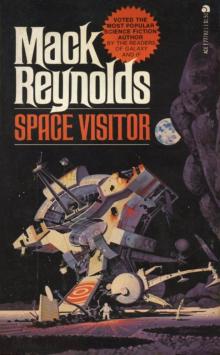 Space Visitor
Space Visitor A Kiss Before Loving
A Kiss Before Loving Episode on the Riviera
Episode on the Riviera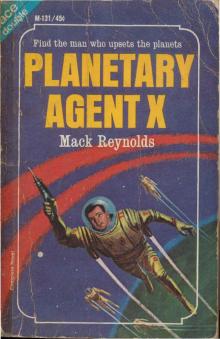 Planetary Agent X
Planetary Agent X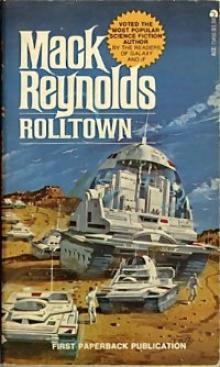 Rolltown bh-3
Rolltown bh-3 The Second Mack Reynolds Megapack
The Second Mack Reynolds Megapack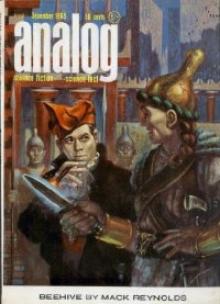 Dawnman Planet up-2
Dawnman Planet up-2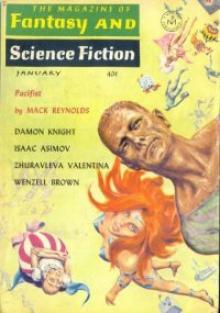 Pacifist
Pacifist The Other Time
The Other Time Once Departed
Once Departed IQ
IQ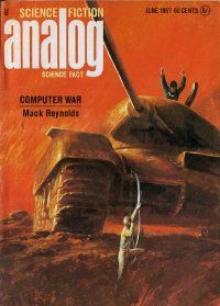 Computer War
Computer War Earth Unaware
Earth Unaware The Rival Rigelians up-3
The Rival Rigelians up-3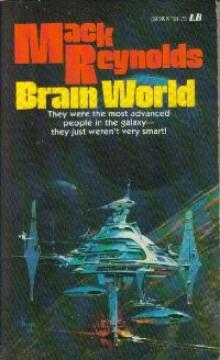 Brain World up-7
Brain World up-7 Star Trek - TOS - Mission to Horatius
Star Trek - TOS - Mission to Horatius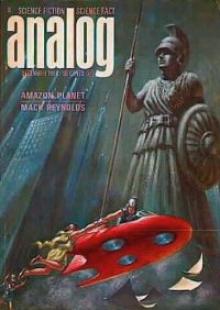 Amazon Planet up-5
Amazon Planet up-5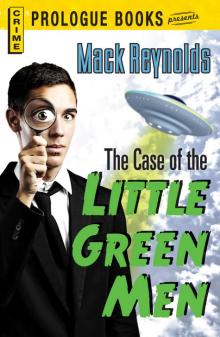 The Case of the Little Green Men
The Case of the Little Green Men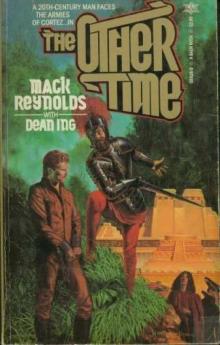 Other Time
Other Time The Mack Reynolds Megapack
The Mack Reynolds Megapack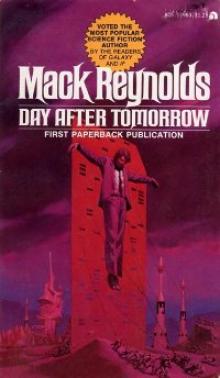 Day After Tomorrow
Day After Tomorrow The Devils & Demons MEGAPACK ®: 25 Modern and Classic Tales
The Devils & Demons MEGAPACK ®: 25 Modern and Classic Tales Mission to Horatius
Mission to Horatius Ability Quotient
Ability Quotient Galactic Medal of Honor
Galactic Medal of Honor Trojan Orbit
Trojan Orbit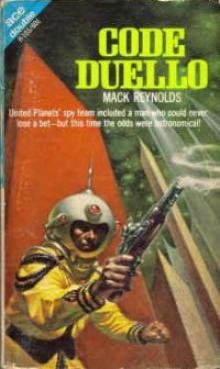 Code Duello up-4
Code Duello up-4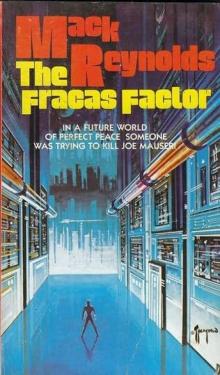 The Fracas Factor
The Fracas Factor The Second Pulp Crime
The Second Pulp Crime Deathwish World
Deathwish World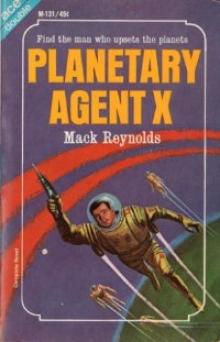 Planetary Agent X up-1
Planetary Agent X up-1 Blackman' Burden na-1
Blackman' Burden na-1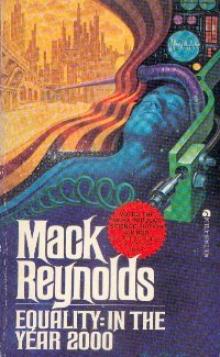 Equality: In the Year 2000 jw-2
Equality: In the Year 2000 jw-2 The Best Ye Breed na-3
The Best Ye Breed na-3 The Jet Set
The Jet Set The Rival Rigelians
The Rival Rigelians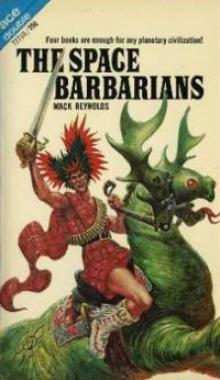 The Space Barbarians
The Space Barbarians